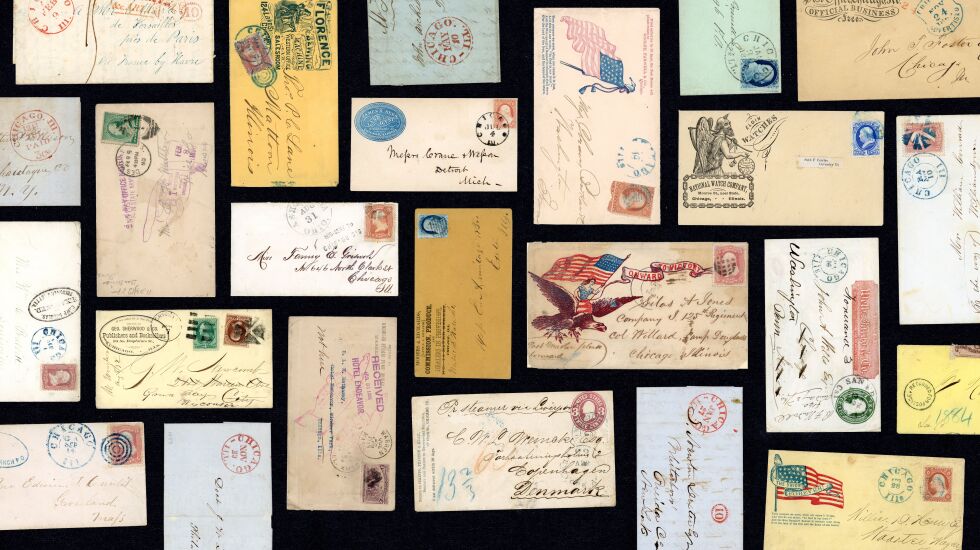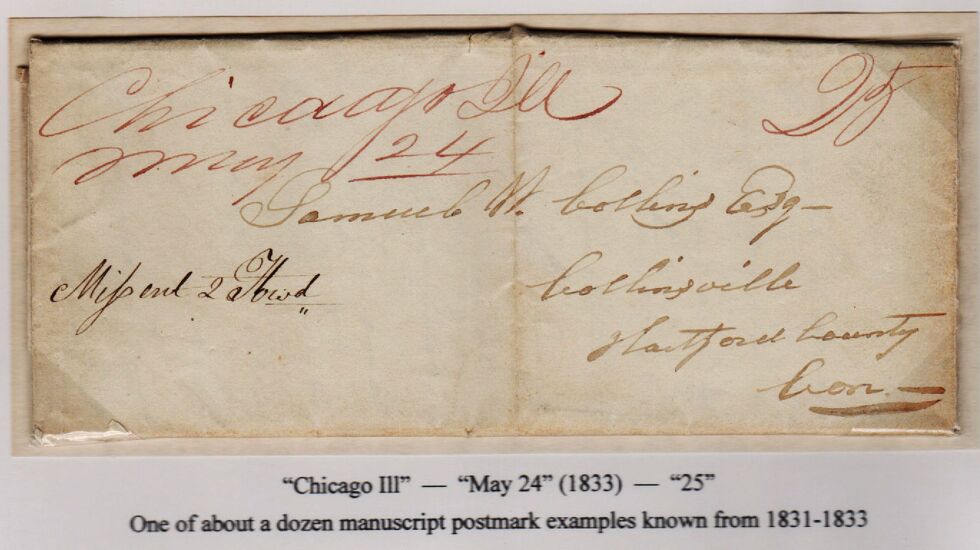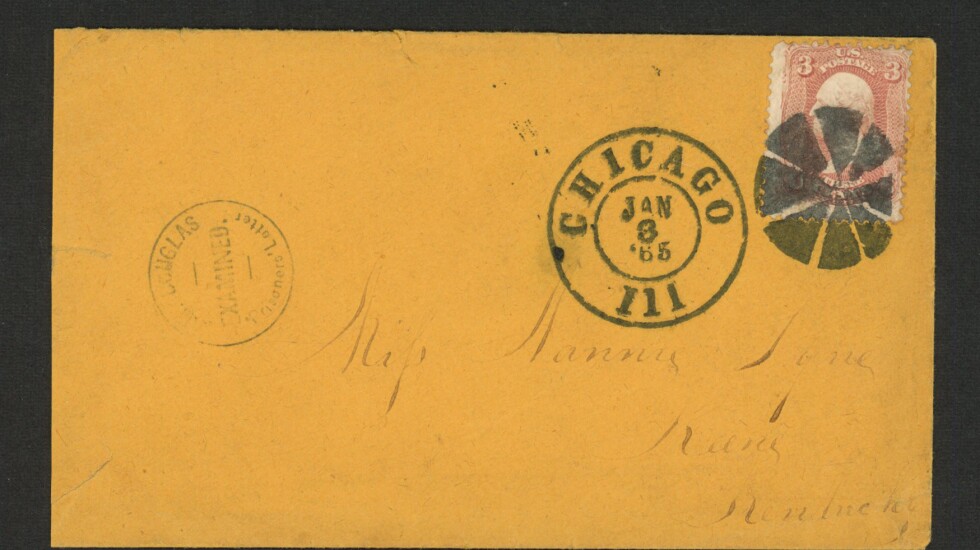
A small cluster of log houses. A cemetery. Fort Dearborn. The constant threat of cholera.
For a distraction in 1830s Chicago, you might have gone on a wolf hunt or enjoyed a half pint of rum for 25 cents. A room for the night cost about half that. Shelter for a horse: 50 cents.
“All together, it would, in the light of 1833, have represented a most woebegone appearance, even as a frontier town of the lowest class. It did not show a single steeple nor a chimney four feet above any roof,” according to an account in A.T. Andreas’ “History of Chicago,” published in 1884.
Ah, but surely you could find salvation in corresponding with someone in New York or Boston? Perhaps, but it would take a horseback rider weeks to deliver the mail.
“There was so little mail going out [from Chicago] that the role of postmaster wasn’t even a full-time position at this point,” said Charles Epting, president and CEO of H.R. Harmer Fine Stamp Auctions in New York.
The job of postmaster was almost a side hustle. Early postmasters were shop keepers, a justice of the peace; at least one dabbled in poetry.
Epting has spent the past six months immersing himself in early Chicago history while he prepares to auction off thousands of pieces of mail, almost all originating from Chicago. The collection, owned by an 82-year-old bachelor who grew up in the city, is set to go on sale on March 28, both online and in person.
About 200 items will be offered individually, with the rest divided into groups. Minimum starting bids are expected to range from about $50 to several thousand dollars, Epting said.
In the early 1830s, New York City had a population of about 200,000, Philadelphia and Baltimore each topped 80,000. Chicago, about 300 people, although that varied depending on sporadic cholera outbreaks.
Because Chicago was such a backwater, it didn’t at first have its own postal stamp. So outgoing mail was postmarked and dated by hand from 1832 through much of the following year. One of the earliest items set to be auctioned features faded red fountain pen looping across an envelope mailed in 1833 from Chicago to Connecticut.

Rates were based on distance and the number of sheets of paper, Epting said. So letters were often written on huge sheets, then folded many times into a little dense square. Sometimes, people wrote from left to right, then turned the page 90 degrees and wrote over what they’d already written.
“I’m not able to read it, but back in the 1840s, it was a skill that people had where they could read the writing going in two different directions,” Epting said.
Epting said there are at least a dozen examples among the auction items.
One letter from November 1847 describes an apparent attempt by a lawyer to get a client released from jail.
“Mr. Hays made another demand today for his prisoner, but the jailer told him that he would not get him, and that he could not scare him ... . This work is killing me,” writes Adam Bogue. “It has made Mr. Hays quite unwell with the anxiety and disappointment.”
One of Epting’s favorites from the collection is an envelope from the 1860s with the words “Death to Traitors” stamped in one corner. It’s like the 19th century version of a profile picture for social media, showing support for the North during the Civil War, he said.
“It’s not saying, we support the North. It’s ‘death to traitors.’ It’s the most heart-on-your-sleeve sentiment you can express,” Epting said.
But it’s amusing, Epting said, because often the letters inside had nothing to do with the war. It might be, he said, a father writing to his daughter about a successful business deal.
One letter came from Camp Douglas, a prison on what’s now the South Side for Confederate soldiers captured during the Civil War. Living conditions could be brutal. By the end of the war, about 4,500 had died at the camp, according to the Encyclopedia of Chicago.
The letter writer, a prisoner named William, writes about 7-foot-high snow drifts and “extremely cold” weather but also about a bountiful Christmas feast at the camp: “We had two turkeys, a quantity of sossage, dried beef, half dosen chickens and other things two numerous to mention.”

Leonard Piszkiewicz is the owner of the collection. He lives in Northern California but grew up in Chicago — in Logan Square and Jefferson Park. He’s a chemist by training. He has a rotary phone and a 1967 metallic green Pontiac Firebird 400 that he bought new off the showroom floor, and he loves collecting things.
“I consider my house a working museum,” Piszkiewicz said. He’s never owned a cellphone, he said.

He has a room filled with mineral samples and another that contains Asian ceramics, mostly Chinese, he said. And he has some two dozen three-ring binders filled with Chicago mail history spanning the 19th and 20 centuries.
“I picked it up when you could, when nobody else cared,” said Piszkiewicz, who said he began collecting stamps as a kid.
He’s written a 573-page coffee table book about Chicago postal history, published in 2006, and he says he no longer has a need for the collection.
“It’s time for this material to find new homes,” he said.
He has no idea what it might fetch at auction — and neither does Epting.
“If something important from Chicago has come up for sale over the last couple of decades, [Piszkiewicz] bought it, basically. So it’s very difficult to predict what the market will be like since he’s cornered it for so long,” Epting said.







